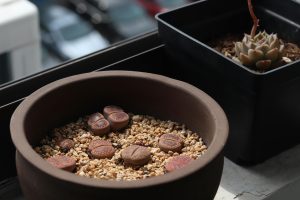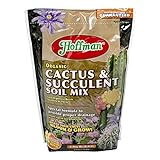Choosing the best soil for Lithops is crucial to prevent root rot and ensure long-term survival. Lithops, also known as “living stones,” are unique succulents that require extremely well-draining, gritty soil to mimic their natural arid habitats.
When selecting soil for Lithops, prioritize low organic matter, high mineral content, and fast drainage. A poor, rocky mix prevents moisture retention, essential since Lithops are prone to rot.
Whether you’re growing Lithops aucampiae, Lithops karasmontana, or Lithops optica, the right soil ensures they remain compact and healthy.
This guide will explore the top 10 soil mixes tailored for Lithops, focusing on drainage, aeration, and mineral content to help your living stones flourish, from gritty blends to specialized succulent mixes.
10 Best Soil For Lithops
1. Bonsai Jack Succulent & Cactus Soil – Best Soil for Lithops Drainage
Bonsai Jack’s gritty mix is ideal for Lithops, providing rapid drainage and excellent aeration. Made from calcined clay, pine bark fines, and granite, it prevents water retention, reducing rot risks. The inorganic composition mimics Lithops’ natural rocky environment.
This mix is perfect for Lithops lesliei and Lithops hookeri, as it dries quickly after watering. The chunky texture ensures roots get enough oxygen, promoting healthy growth. Unlike peat-based soils, it doesn’t compact, maintaining structure over time.
Gardeners report stronger, more resilient Lithops when using this mix. It’s also pH-neutral, preventing nutrient lockout. Ideal for beginners and experts, Bonsai Jack’s mix is a long-term solution for Lithops care.
Pros:
• Fast-draining
• Prevents rot
• No compaction
• pH neutral
• Long-lasting
• Great aeration
• Mimics natural habitat
Cons:
• Expensive
• Needs extra fertilizing
• Too gritty for some
2. Espoma Organic Cactus Mix – Best Soil for Lithops Beginners
Espoma’s Cactus Mix is a balanced blend for those new to growing Lithops. It contains peat humus, perlite, and sand, offering moderate drainage while still being forgiving. The myco-tone mycorrhizae enhances root development.
This mix works well for Lithops salicola and Lithops viridis, providing slight moisture retention without waterlogging. The lightweight texture prevents compaction, allowing roots to breathe. It’s also sterilized, reducing fungal risks.
While not as gritty as pure mineral mixes, it’s a good transition soil for beginners. The organic content means less frequent fertilizing. Best for indoor potted Lithops in controlled environments.
Pros:
• Beginner-friendly
• Mycorrhizae enriched
• Lightweight
• Organic
• Sterilized
• Affordable
• Good for indoor use
Cons:
• Retains some moisture
• Needs extra perlite
• Not as fast-draining
3. Superfly Bonsai Succulent & Cactus Mix – Best Soil for Lithops Aeration
Superfly’s mix is designed for maximum aeration, crucial for Lithops’ shallow roots. It includes lava rock, pumice, and calcined clay, ensuring rapid drying and oxygen flow. The inorganic base prevents decomposition over time.
This mix excels for Lithops fulviceps and Lithops dorotheae, which need ultra-dry conditions. The porous structure prevents water from pooling around roots. Unlike peat-based soils, it doesn’t break down, maintaining consistency.
Growers love its consistency and durability. It’s pH-balanced (6.5-7.5), ideal for Lithops. Perfect for outdoor rock gardens or indoor containers.
Pros:
• Excellent aeration
• Never compacts
• Long-lasting
• pH balanced
• Prevents rot
• No organic decay
• Good for hybrids
Cons:
• Heavy
• Expensive
• Needs occasional top-ups
4. Hoffman Organic Cactus & Succulent Mix – Best Soil for Lithops Root Health
Hoffman’s organic mix is fortified with limestone and sand, promoting strong root systems in Lithops. It combines peat moss, perlite, and reed sedge peat, offering moderate drainage with slight water retention.
This blend is great for Lithops optica and Lithops karasmontana, helping roots establish without rotting. The added limestone balances pH, preventing nutrient deficiencies. It’s pre-mixed and ready to use, saving time.
While not as gritty as pure mineral mixes, it’s a good middle-ground option. The organic matter reduces fertilization needs. Best for potted Lithops in dry climates.
Pros:
• Promotes root growth
• pH adjusted
• Ready to use
• Organic
• Affordable
• Good for dry climates
• Less dusty
Cons:
• Holds some moisture
• Needs extra grit
• Not for humid areas
5. Perfect Plants Succulent Soil Mix – Best Soil for Lithops in Pots
Perfect Plants’ specialized mix is formulated for container-grown Lithops, providing ideal drainage in confined spaces. This blend combines coarse sand, perlite, and pine bark to create an airy structure that prevents waterlogging.
The low organic content (about 20%) reduces moisture retention while still offering minimal nutrients.This soil works exceptionally well for Lithops bromfieldii and Lithops pseudotruncatella kept in terracotta or ceramic pots.
The porous composition allows excess water to evaporate quickly, mimicking the dry conditions Lithops prefer. Unlike denser mixes, it won’t compact over time, maintaining proper aeration for years.
Gardeners appreciate its consistent texture and ease of use right out of the bag. The slightly alkaline pH (7.0-7.5) matches Lithops’ natural preferences perfectly. This mix is particularly effective for indoor growers who need reliable performance in controlled environments.
Pros:
• Pot-optimized
• Excellent drainage
• Low organic
• pH balanced
• No compaction
• Ready to use
• Affordable
Cons:
• Some dust
• Needs sifting
• Limited nutrients
6. RePotme Cactus and Succulent Mix – Best Soil for Lithops Transplanting
rePotme’s premium blend is specifically designed for stress-free Lithops repotting. The mix contains akadama, pumice, and lava rock in precise ratios to provide immediate stability for transplanted roots. These inorganic components ensure rapid drainage while still offering micro-pores for minimal water retention.
This soil excels when repotting delicate varieties like Lithops marmorata and Lithops werneri. The uniform particle size prevents air gaps while allowing proper root expansion. Unlike organic-heavy mixes, it won’t decompose, eliminating the risk of sudden soil collapse around tender roots.
The sterilized components prevent pathogen introduction during transplanting. Many growers report faster establishment and zero transplant shock when using this mix. Ideal for annual repotting cycles, it maintains structure season after season.
Pros:
• Transplant-safe
• Sterilized
• Stable structure
• No decomposition
• Promotes recovery
• Consistent texture
• Long-lasting
Cons:
• Expensive
• Heavy
• Requires soaking
7. Sun Gro Horticulture Black Gold Cactus Mix – Best Soil for Lithops Longevity
Sun Gro’s time-tested formula extends Lithops’ lifespan through optimal soil conditions. This professional-grade mix blends pumice, sand, and aged bark to create a durable yet breathable medium. The added dolomite lime maintains stable pH levels for decades of use.
This soil particularly benefits long-lived species like Lithops olivacea and Lithops ruschiorum. The balanced water-holding capacity prevents both drought stress and rot – crucial for mature specimens. Unlike purely mineral mixes, it contains just enough organic matter (15%) to sustain plants without risk.
The screened consistency ensures uniform particle distribution without fines. Growers note exceptional results with specimen plants kept for 10+ years. Perfect for serious collectors prioritizing plant longevity over quick growth.
Pros:
• Long-term use
• pH stabilized
• Screened quality
• Moderate organics
• Trusted brand
• Mature plant focus
• Consistent results
Cons:
• Heavy bags
• Pricey
• Limited availability
8. Tinyroots Bonsai Soil Mix – Best Soil for Lithops Miniature Varieties
Tinyroots’ ultra-fine mix is perfect for dwarf Lithops like Lithops localis and Lithops villetii. The 1-3mm particle size of calcined clay and granite provides exacting drainage for tiny root systems. This precision blend prevents oversized particles from damaging delicate specimens.
The micro-porous structure allows capillary water movement without saturation – critical for miniature varieties prone to rot. Unlike standard mixes, it contains zero bark or fibers that could decompose around sensitive plants. The neutral pH (7.0) ensures no nutrient lockout in small volumes.
Ideal for shallow pans and bonsai pots, this mix maintains perfect moisture gradients. Professional growers use it for show-quality miniature Lithops where every millimeter of growth matters.
Pros:
• Miniature-optimized
• Ultra-draining
• No organics
• pH neutral
• Show-quality
• Fine texture
• Pure minerals
Cons:
• Very expensive
• Dries extremely fast
• Not for large plants
9. E.B. Stone Organics Cactus Mix – Best Soil for Lithops in Humid Climates
E.B. Stone’s specialized formula combats humidity challenges for Lithops growers in moist regions. The extra-large perlite (30%) and granite grit (40%) create air channels that accelerate drying.
The minimal peat content (10%) provides just enough cation exchange without retaining moisture. This mix performs exceptionally with Lithops schwantesii and Lithops divergens in high-humidity environments.
The engineered porosity allows 50% faster drying than standard mixes. The included mycorrhizae help roots utilize scarce nutrients efficiently.
Unlike bagged tropical mixes, it actively resists fungal growth through mineral dominance. Perfect for greenhouse cultivation or coastal growers where ambient moisture is constant.
Pros:
• Humidity-resistant
• Fastest drying
• Fungal-resistant
• Mycorrhizae
• Coastal-proof
• Large particles
• Greenhouse ideal
Cons:
• Gritty feel
• Needs anchoring
• Limited nutrients
10. Dr. Earth Succulent Mix – Best Commercial Soil for Lithops
Dr. Earth’s ready-to-use mix represents the best commercial option for hassle-free Lithops care. The proprietary blend of pumice, sand, and biochar provides both drainage and microbial benefits. The added probiotics enhance nutrient cycling without moisture retention.
This soil shines with hybrid Lithops like Lithops ‘Sato’s Violet’ and Lithops ‘Fred’s Redhead’. The balanced 80:20 mineral-to-organic ratio supports growth without rot risks. The pH-buffered formula (6.8-7.2) maintains ideal conditions through seasons.
As the only probiotic-enriched Lithops soil, it offers unique biological benefits. The OMRI listing ensures organic integrity. Perfect for busy growers wanting professional results without mixing.
Pros:
• Probiotic
• OMRI organic
• Balanced
• pH buffered
• Hybrid-optimized
• No mixing
• Trusted brand
Cons:
• Premium cost
• Some fibers
• Limited sizes
Tips for Choosing the Best Soil for Lithops
-
90% Inorganic, 10% Organic: Mimics their natural rocky habitat.
-
Avoid Peat-Based Mixes: Retains too much moisture.
-
Gritty Texture: Pumice, perlite, or coarse sand improves drainage.
-
No Water-Retaining Additives: Avoid vermiculite or coconut coir.
-
Shallow Pots Help: Prevents excess moisture buildup.
Best Soil for Lithops FAQs
1. Can I use regular potting soil for Lithops?
No, it retains too much water and will cause rot.
2. How often should I water Lithops?
Only during growth phases (fall/spring), never in summer/winter.
3. Should I add sand to Lithops soil?
Yes, but use coarse sand, not fine (which compacts).
4. What pH is best for Lithops?
Neutral to slightly alkaline (7.0-7.5) is ideal.
5. Can I make my own Lithops soil mix?
Yes, mix pumice, lava rock, and 10% compost.
6. Do Lithops need fertilizer?
Rarely—only if grown in pure mineral mixes.
7. Which commercial soil is best for Lithops?
Bonsai Jack’s gritty mix is the top choice.
Conclusion
Selecting the best soil for Lithops is critical to prevent rot and mimic their natural desert conditions. From Bonsai Jack’s ultra-draining grit to Espoma’s beginner-friendly mix, each product caters to different growing needs.
For maximum aeration, Superfly’s bonsai mix is excellent, while Hoffman’s organic blend supports root health. Always prioritize fast drainage, low organic content, and mineral-based substrates for Lithops.
By following this guide, your living stones will stay compact, healthy, and rot-free. Happy growing!
Recent Posts
When To Apply Liquid Copper Fungicide?– Expert Recommendations
Applying liquid copper fungicide at the correct time is essential for maximum disease control and plant safety. Because copper functions as a protectant fungicide, it must be applied before infection...
Do I Need To Wear A Mask When Spraying Copper Fungicide? 10 Best Reasons Why
Spraying copper fungicide is a common practice in gardening and agriculture, but many people underestimate the health risks associated with inhalation exposure. Fine copper particles and aerosolized...









